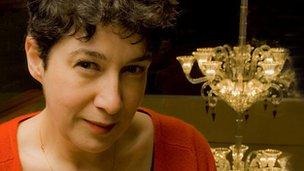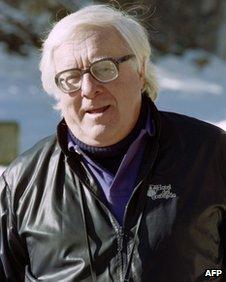Joanne Harris: Bradbury was 'a bright, burning spark'
- Published

Joanne Harris says Bradbury was one of her literary heroes
Novelist Ray Bradbury, author of Fahrenheit 451, has died aged 91.
The author, who penned 27 novels and more than 600 short stories, was often credited with elevating the much-maligned reputation of science fiction.
His distinguished and prolific career was an influence on many writers, both within and without the fantasy genre.
Among his many fans was Joanne Harris, best-selling author of Chocolat and Five Quarters Of the Orange. She told the BBC News website why he had been a key figure in her literary upbringing.
"I am a very big fan of his work, and of him too.
"I only met him once. We had dinner, he and his wife and I, in Los Angeles, and I was so overawed by him because he'd been such a hero of mine for many, many years.
"When I got to meet him I realised that he was one of those few people who actually exceeds your expectations, in human terms.
"He was the most delightful man, sweet and terribly youthful in spite of his quite advanced years, and still so in love with his wife - they'd been married 58 years when she died.
Joanne Harris says she was "starstruck" by the writer
"He was such a bright burning spark of a man, it was incredible.
"I think he is greatly loved in schools for a start because he was the voice of youthful exuberance all his life and he retained that.
"Even into his 80s and 90s he was still excited and in awe of everything around him, and that really came out in his writing.
"There is this real sense of wonder in all of his writing, and discovery. And when you look at his later work, the things he wrote in the last five years or so, it is still there.
"But there's also a sense of being in a hurry to discover as much as possible of life before it ends, and it's so moving.

As well as his novels, Bradbury wrote for The Twilight Zone and Alfred Hitchcock Presents
"All his stories are so memorable and so unique. But I love his introduction to S Is For Space where he says 'Mary Shelley was my mother, Charles Dickens was my grandfather, Edgar Allan Poe was my father.'
"He puts a voice to something that I'd long felt about this kinship with your favourite authors and your heroes. By that token I sort of felt he was the grandfather I should have had, in literary terms.
"He could do dystopian, as in Fahrenheit 451. But most of the time I got the feeling his sense of the future was still filled with excitement. He was excited by space, by rockets, by exploration, by possibilities.
"What depressed him was the idea of the diminishing of the human spirit and people losing their imagination and becoming institutionalised. That was the dystopian side of him, but the rest of him was full of optimism.
"Some know him through the films that have been made of his work, but I think he's a bit of a challenge to adapt. In a lot of ways, film adaptation leaves out the essential artistry of the man.
"He was a great storyteller, and his stories do translate well to the screen. But he had this eccentric, exuberant style and verve, and that personality doesn't come out on film the way it does on the page. So you can only really get a pale reflection of what he's really like.
"For young readers, I think starting off with his short stories is never a bad idea. His collections of short stories are wonderful and really do appeal to young people. By nine, I had written half of what he'd written already.
"Plus he's got children's books like The Halloween Tree and Something Wicked This Way Comes which really tap into what it feels like to be 12 or 13 and just discovering the world.
"It's a sad day. I'm sorry to hear of his passing and I really do feel for his family. He was a wonderful man."
- Published6 June 2012
- Published6 June 2012